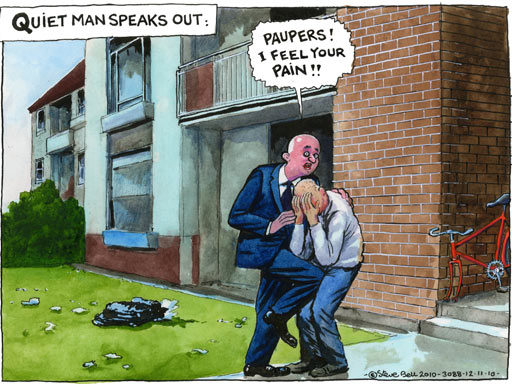Political events this week have again illustrated the stark divide between the affluent few at the top and the majority of the population who struggle to remain above water. Whilst the government seeks to create a finite universal benefit, the pay of financial executives – often underpinned by the public purse – continues to soar.
As George Monbiot said in a recent column arguing for the introduction of a maximum wage:
As George Monbiot said in a recent column arguing for the introduction of a maximum wage:
The income of corporate executives ... is a form of institutionalised theft, arranged by a kleptocratic class for the benefit of its members. The wealth which was once spread more evenly among the staff of a company, or distributed as lower prices or higher taxes, is now siphoned off by people who have neither earned nor generated it.
Over the past ten years, chief executives’ pay has risen nine times faster than that of the median earner. Some bosses (British Gas, Xstrata and Barclays for example) are now being paid over 1000 times the national median wage.
At the same time, companies such as Vodafone, Topshop and British Home Stores have had huge tax bills written off whilst banking chiefs have continued to pocket huge bonuses, despite many being heavily subsidised by tax payers’ money. For instance, following the bailout of RBS, the UK government owns an 84% stake in the company. Yet in 2010, the RBS CEO Stephen Hester was paid a staggering £7.7m of which £2m was a ‘bonus’. I wonder how many people on Jobseekers’ Allowance or Employment Support Allowance received a state-sponsored ‘bonus’ for Christmas.
Vince Cable’s attempt to harness executive pay – through increasing transparency and shareholder influence – represent nothing more than impotent posturing. As Monbiot notes, pay transparency could “create the perverse result that executives discover how much their rivals are getting, and use the information to demand more”.
This highlights a structural paradox between how we conceptualise the public and private sectors. Executive pay in the private sector always seeks to level-up pay and benefits to ensure that companies remain competitive and can attract the best talent. Conversely – as demonstrated by the public sector pensions dispute – the debate around the lower end of the labour force always focuses on eroding public sector pay and conditions in line with the private sector. Both arguments – consistently forwarded by business, media and politicians – are mutually exclusive.
It is frightening that political and media rhetoric – which habitually demonises benefit claimants as feckless scroungers – can be so weak when challenging the power and influence of big business. The media is all too eager to attack ‘parasitic’ benefit claimants, but is less vehement in its pursuit of private sector leeches gorging on the public purse.
One of the key reasons for the rising benefit bill – neglected by most mainstream media – has been the cost of subsidising private landlords through housing benefit. It’s time to stop bankrolling private sector sponges – from landlords to banking executives – and use the money to build affordable social housing and create real employment opportunities.
To paraphrase Slavoj Zizek, John Pilger and Noam Chomsky, it’s socialism for the rich and capitalism for the poor.
Vince Cable’s attempt to harness executive pay – through increasing transparency and shareholder influence – represent nothing more than impotent posturing. As Monbiot notes, pay transparency could “create the perverse result that executives discover how much their rivals are getting, and use the information to demand more”.
This highlights a structural paradox between how we conceptualise the public and private sectors. Executive pay in the private sector always seeks to level-up pay and benefits to ensure that companies remain competitive and can attract the best talent. Conversely – as demonstrated by the public sector pensions dispute – the debate around the lower end of the labour force always focuses on eroding public sector pay and conditions in line with the private sector. Both arguments – consistently forwarded by business, media and politicians – are mutually exclusive.
It is frightening that political and media rhetoric – which habitually demonises benefit claimants as feckless scroungers – can be so weak when challenging the power and influence of big business. The media is all too eager to attack ‘parasitic’ benefit claimants, but is less vehement in its pursuit of private sector leeches gorging on the public purse.
One of the key reasons for the rising benefit bill – neglected by most mainstream media – has been the cost of subsidising private landlords through housing benefit. It’s time to stop bankrolling private sector sponges – from landlords to banking executives – and use the money to build affordable social housing and create real employment opportunities.
To paraphrase Slavoj Zizek, John Pilger and Noam Chomsky, it’s socialism for the rich and capitalism for the poor.




